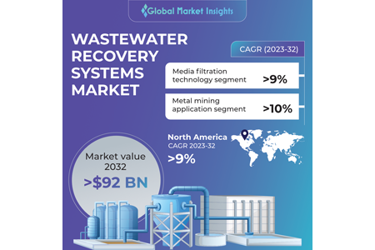Increasing Water Shortage To Boost The Acceptance For Wastewater Recovery Systems Market
By Vijay Ovhal

With the worsening scenario of water scarcity across major world economies, the need for deploying wastewater recovery systems stands crucial to ensure the availability of fresh water among the masses.
The increasing scarcity of water and the anticipated risks associated with climate change has charted out a highly profitable growth path for the global wastewater recovery systems market in the last few years.
Most businesses that hugely rely on consistent water supply are now transitioning toward exploring and deploying water recovery systems that can effectively minimize the risks of unstable water resources. Besides, legislative bodies and the global community are also taking an increased interest in harnessing the potential of wastewater as a resource, which can be a major factor in boosting the installation of wastewater recovery systems, thus driving the market growth.
An instance validating the authenticity of the aforementioned is that of the U.S. EPA issuing the Effluent Guidelines for the licensing and approval of wastewater discharge through commercial and industrial operations. Several other regulatory authorities also have ostensibly embarked on recognizable efforts to ensure the proper treatment of wastewater.
Emergence of efficient wastewater technologies to make way for wastewater recovery systems
Of late, wastewater recovery systems market have gained increased traction through recycling wastewater which has turned out to be an efficient measure to relieve the pressure on environmental conservation and water resources.
According to facts published in the United Nations Environmental Programme (UNEP) report, by 2030, the demand for water worldwide will transcend the sustainable supply by 40%. However, without effective wastewater recovery and efficient conservation of natural resources, it is foreseen that organizations operating in water-intensive industries and drought-prone areas will face major challenges in sustaining their manufacturing lines and facility operations.
With the evolving technological landscape and the emergence of cost-effective solutions regarding wastewater recovery systems, several end-use verticals, including electronics, food & beverage, chemical, pharmaceutical, metal, and mining, have now begun adopting these devices on a massive scale. This, in consequence, will drive wastewater recovery systems market trends in the years to come.
This apart, there has been an increased rage for natural filtration and treatment processes, which have inherently contributed toward driving product demand. For instance, media filtration, membrane filtration, ultrafiltration, and reverse osmosis are categorized as some of the most promising technologies used in wastewater recovery systems.
Having said that, a noticeable decline in the cost of membranes with consistent improvement in operational efficiency has spurred the demand for membrane filtration-based wastewater recovery systems.
Expansive application spectrum "offering ample prospects for wastewater recovery systems market growth"
Among the innumerable water-intensive business verticals embracing wastewater recovery systems, food & beverage, pharma, and mining industries deserve special mention. F&B, in particular, gained recognition as one of the largest water consumers and consequently, one of the biggest producers of brine or wastewater. Formerly, wastewater from food processing factories was released in evaporation ponds.
However, as environmental norms made such ponds obsolete, the food industry quickly shifted toward advanced membrane filtration systems to reuse and recover the water produced during processing resulting in zero discharge. Zero liquid discharge also gained tremendous popularity across the mining industry, where thermal and non-thermal solutions are extensively utilized to retrieve a substantial amount of wastewater and decrease brine.
Stringent regulatory framework to pave the way for more opportunities
Environmental regulations have played an influential role in augmenting the wastewater recovery systems demand. Advocacy groups and scientists are maximizing awareness about the significance of water resources and their connection to creating clean energy. Wastewater has actually led to major disruptions in the natural water cycle that holds a balance among all organisms in the ecosystem.
As the accelerating climatic change and the rising frequency of droughts continue to pose a detrimental impact on businesses with manufacturing hiccups, the wastewater recovery systems industry is set to witness a significant upsurge over the coming years.
Collaborative efforts to redefine industry outlook
Numerous industrial sectors, in an effort to combat water scarcity, have been infusing significant funds to avoid water shortage-related complexities. Water-intensive sectors are also projected to adhere to environmental regulations stressing the importance of bringing back balance in the natural water cycle.
Aided by a strong regulatory framework and the rising efforts of participatory companies, the wastewater recovery systems industry will assume unprecedented growth in the foreseeable future. For instance, in March 2023, Evoqua Water Technologies, a leading company dealing in mission-critical water treatment solutions, announced the acquisition of former Bob Johnson & Associates from Kemco Systems, an industrial water treatment service firm based in Texas to strengthen its service footprint and aftermarket business in the state. This will help support the company's ability to better serve and support its industrial customers in the region.
Source: https://www.gminsights.com/industry-analysis/wastewater-recovery-system-market
